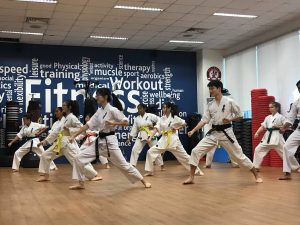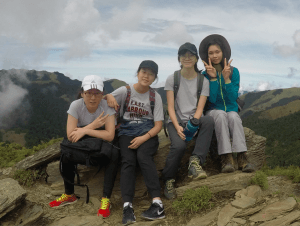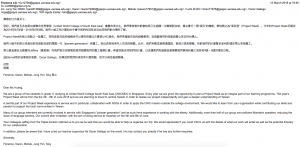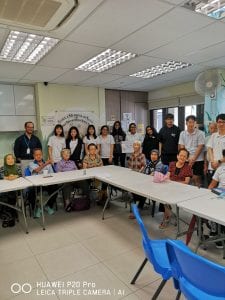Author: liu12794@gapps.uwcsea.edu.sg
Karate 3
Throughout grade 11 and 12 I have consistently been participating in karate. As one of the black belts I have been taking on a leadership role in this activity by leading activities and coaching younger members of the club. I think that this has been one of the most meaningful contributions I’ve made to the community as I have been able to form relationships with other members of the club by guiding them through their karate learning journey.
Recently there was a karate grading at school and I was responsible for announcing the results of the grading after the December break. Seeing the excited and proud expressions on the faces of some of the children who I’d mentored was an exciting moment for me as I felt like I had contributed to these students’ success in karate, and I was able to see the results of my work. Overall, being a part of the karate community at school has opened my eyes to how I can make a difference to the people around me.

Project week 4
Throughout our week-long trip to Taichung during project week, our team had a variety of opportunities to develop skills such as communication, teamwork, and decision-making.
One of the most meaningful experiences during our trip was meeting members of the elderly with Huashan Social Welfare Foundation. This was challenging for me because we had to deal with a language barrier as none of our group members could speak Hokkien, meaning that we had to communicate through an interpreter. I felt that this made the experience feel a bit more foreign than previous experiences communicating with the elderly (such as spending time with my grandparents, or during my local service). Another challenge our group faced was remaining mindful of ethical concerns with regards to photography. In our excitement to chronicle the moments, we sometimes forgot to take pictures from an angle where the elderly’s face would be covered or hidden. However, we made sure to respect the elderly’s right to privacy and did not upload any pictures where their identities would be exposed onto social media platforms.
Another difficulty that arose during our trip was that one of our group members had to leave early as a result of a family emergency. This was a bit of a shock to the group as we hadn’t thought about what to do in such a situation, and was a test of our ability to choose a course of action with limited time to spare. Fortunately we were able to quickly coordinate a plan and made sure to escort the group member to the coach station so she could go to the airport by herself. This incident brought our team closer together as we had to think quickly and act as a whole to make sure our group member could make it to the airport on time, and therefore had a shared bonding experience.
Project week 3
Our plans for project week were to arrive in Taichung, do two days of service at Huashan Social Welfare Foundation, and then do two days of hiking on Hehuanshan before returning to Singapore.

During our time volunteering at Huashan we participated in various activities in order to better understand the challenges that the elderly may face. We took part in a workshop by one of the social workers at Huashan which illustrated some issues that the elderly may have difficulties with – for example, we wore glasses and earmuffs to experience the difficulty of having deteriorating senses, and wore gardening gloves to experience impaired mobility and motor skills.

We also visited a nearby hospital with mobility assistance equipment (such as wheelchairs), and were able to try out these pieces of equipment. A member of staff at the hospital also talked us through some of the challenges mobility-impaired people may face in environments that may seem easy to navigate, such as the living room and bathroom. I found this very interesting as I was able to gain insight to the challenges that the elderly may face, that I had never previously considered.

One of the most rewarding aspects of our volunteer experience at Huashan was visiting some elderly members of the community in Taichung. Many of these aunties and uncles lived alone, and I felt very honoured to be able to visit them and pay them company, as well as listen to them as they talked about small anecdotes from their day-to-day lives.


Something interesting that I learned from our volunteer experience was that in Taiwan, receipts can be used to redeem cash prizes! Despite being from Taiwan and having visited Taiwan many times, I didn’t know that one could match up the end-digits on a receipt with the winning digits and redeem money. One of the tasks we helped with was categorising receipts by end-digit, and then sorting through each stack of receipts in order to see if there were any winning receipts. Using receipts to redeem cash prizes is one of the means that Huashan uses to sustain itself, so it was very exciting for us when we found a few winning receipts!

Our hike to Hehuanshan was one of the most memorable aspects of our trip, as we had to deal with the physical and mental challenges of a high altitude trek. The hike was physically quite challenging, as the path up the mountain consisted of many steep ‘steps’ carved into the face of the mountain. However, while the walk was extremely draining physically, I found it even more difficult mentally. On paper, the trek looked quite short, but the distance that we had to walk didn’t account for all of the ups and downs of the mountainous path. There were also many small peaks on the way to the main peak that we had to reach, and this meant that there were many times where we falsely thought that we had finally reached our goal and could begin the descent. There were even points where we (jokingly) discussed whether or not we should just call it quits and make our way back down again. However, if presented with the opportunity, I would still choose to do the same hike again because of how rewarding it felt to finally reach the peak and enjoy the view of where we had began from.



Creativity and Service: Memoirs of the Pioneer Generation 4
I believe that Memoirs of the Pioneer Generation has been one of the most meaningful CAS experiences that I have had the chance to take part in.
Firstly, Memoirs was a big departure from my comfort zone. In my previous service experiences, I had only worked with younger children and thus didn’t have much experience working with elderly members of our local community. One of the biggest challenges I faced at the beginning of the year was feeling comfortable around the elderly and helping the elderly to feel comfortable, and this was one of the biggest barriers to our communication. As the year went on, I became more relaxed around the elderly that I partnered with and I feel that there was a mutual ‘opening-up’ which enabled us to build a stronger connection.
Additionally, this experience was my first time using my skills in Chinese in a service setting. I felt very fortunate to be able to communicate with the elderly directly due to my ability to speak in Chinese, and I was also able to help others by acting as a translator. However, I still faced some issues with language barrier – there were some instances where I still felt as if I couldn’t convey a message accurately enough in Mandarin, and some members of the elderly spoke primarily Hokkien, a dialect that I am unfamiliar with.
Most importantly, I think that this service opened my eyes towards the significance of the aging population. This is an issue that is impacting many (if not most) societies today, but that I hadn’t previously thought about. I, personally, am very lucky as my grandparents are all in good health and surrounded by family members who can care for them or otherwise keep them company. However, many of the aunties and uncles who I met through this service are not as fortunate as my grandparents, and may often feel lonely. This service really encouraged me to empathise more with the elderly, who – though we may not mean it – we often neglect. Following my experiences in this service, I have resolved to spend more time talking to my grandparents and asking them about stories from their youth, which could otherwise disappear.
Below is a picture from our final session at the Lion’s Home for the Elderly!
Creativity and Service: Memoirs of the Pioneer Generation 3
Project week 2
During the project week planning process, I took on the role of logistics coordinator.
As part of this role, I took responsibility for helping to find suitable flights and accommodation. We found a Japanese-style hotel room near to Taichung train station that would be able to fit all five of our group members, but due to the heavy workload that we were faced with at the time, we temporarily put off booking our accommodation. When we returned to make the booking, the price of the accommodation had risen so that it was now outside of our budget, so I had to book our back-up option instead. This was a new experience for me because project week was my first time planning a trip within a very strict budget (previous planning experiences have all been a lot more flexible than project week).


In addition to booking accommodation, I worked with another group member to get in contact with an outdoor activity provider for the adventure portion of project week. I found this to be one of the more stressful portions of the planning process as we had to change adventure provider multiple times due to budgeting issues and concerns from the school regarding the qualifications of the guides. Though the responsibility of liaising with the adventure provider was not delegated to me, I helped the group member in charge of contacting the adventure provider to draft and respond to emails.

My final tasks as the logistics coordinator were to plan out the itinerary and calculate the budget for our trip. I found calculating the budget to be the most draining and tedious task, as the budget was very tight. It was extremely difficult to make sure that we stayed within budget due to the high costs of our flights and adventure costs, which combined took up 70% of our budget. The budget was a key topic of ethical debate, as I had heard stories of previous project week groups who left many other costs outside of their budgeting in order to appear as if they were within budget. However, as a result of the budgeting process I was able to develop my research skills – for example, I used the Internet extensively in order to check the average cost of a meal in Taichung as well as the public transportation fares that we would need to factor in.

In addition to the aforementioned tasks, I also worked to liaise with the service provider. The service provider we worked with was Huashan Social Welfare Foundation, recommended to me by my family living in Taiwan. Huashan works with elderly members of society in Taiwan, many of whom live alone or have mental or physical conditions, by visiting them and providing them with any products they may need, as well as a ‘link’ to society. I was highly interested in this as I had been working with the elderly for my local service CAS experience (Memoirs of the Pioneer Generation), and therefore already had some awareness on the struggles that the elderly can face, particularly now that Singaporean society is beginning to age. In addition, my mum’s side of the family is from Taiwan and through my previous visits to Taiwan I was aware of the problems that Taiwan is facing with regards to the aging population, and the global issue of aging populations. Consequently, I was very eager to volunteer at Huashan.
Liaising with Huashan was both challenging and rewardable as the communication took place in Chinese. I am fluent in oral Mandarin and can read and write to a proficient level, but had never communicated formally in written Chinese before, so I found the task of emailing Huashan to set up contact slightly daunting at first.
Below are screenshots of a couple of the emails I exchanged with Amy, the head of Huashan’s regional branch in Taichung. In each email I sent, I made sure to also include an English version below for our group members and supervisor.


I worked with Amy to create the itinerary for our two days of volunteering at Huashan, and translated a version into English for our group members.
Overall, I found the planning process to be quite enjoyable and a great opportunity to learn more. This was my first time planning a trip totally independently without much input from adults, and within a quite strict set of guidelines. This was a good opportunity for me to develop independence and leadership skills, as I took responsibility for a wide array of tasks within our group.
EE final reflection
One of the challenges I faced while writing my EE was finding a balance between presenting a historical narrative of events and analysing the significance of the different factors. One of my biggest takeaways from the process was learning how to make my voice come through the essay by signposting my arguments. Furthermore, the EE helped me to better understand the difficulty of reconciling various perspectives in order to formulate one’s own perspective on an event. It was difficult to determine the relevant significance of various factors, and I found my opinion on what the most significant cause of the Salem witch trials changed multiple times as I did more research. The EE-writing process has highlighted the importance of critically analysing the value and limitations of sources, as this enabled me to make more accurate judgements on the relative usefulness of different perspectives and subsequently form a more robust opinion as to why the Salem witch trials occurred.
Word count: 158
EE interim reflection
Through my research I have gained a deeper understanding of the structural causes of the Salem witch trials. I was especially intrigued by literature on the significance of village factionalism, as this places the trials in the wider context of societal change in Massachusetts. Consequently, I have reverted back to my original view that long-term socioeconomic factors were most significant in leading to the trials. I think this has highlighted the dangers of viewing historical events in isolation, as removing context can obscure certain elements of the narrative. Furthermore, this has demonstrated the significance of perspective in historiography. By reading sources from a wide range of perspectives, I now understand my topic from multiple ‘angles’. Moving forward, I would like to analyse the validity of these arguments by comparing sources against primary evidence from the trials in order to determine the value and limitations of each viewpoint, and establish my own view on why the Salem witch trials occurred.
Word count: 159
Project week 1
So far I have found project week planning to be an at times tiring but overall productive and interesting experience. Our group has faced various challenges, such as being asked to change our location from Taipei to Taichung in Taiwan, as well as having to switch adventure providers three times. I have also had the opportunity to take on a leadership position in the group by liaising with our service partner in Chinese to create a detailed service itinerary, which has been an interesting challenge and helpful for helping me to improve my Chinese in a different setting than the classroom. Some of these challenges and developments are outlined in this short video of me and one of my group members:
Looking forward I would like to continue developing my leadership skills in the group. Though usually I tend to take on a more passive role, taking on an active role in the planning process has showed me that I am able to take on and delegate responsibility and I would like to carry this on outside of our project week group as well.






